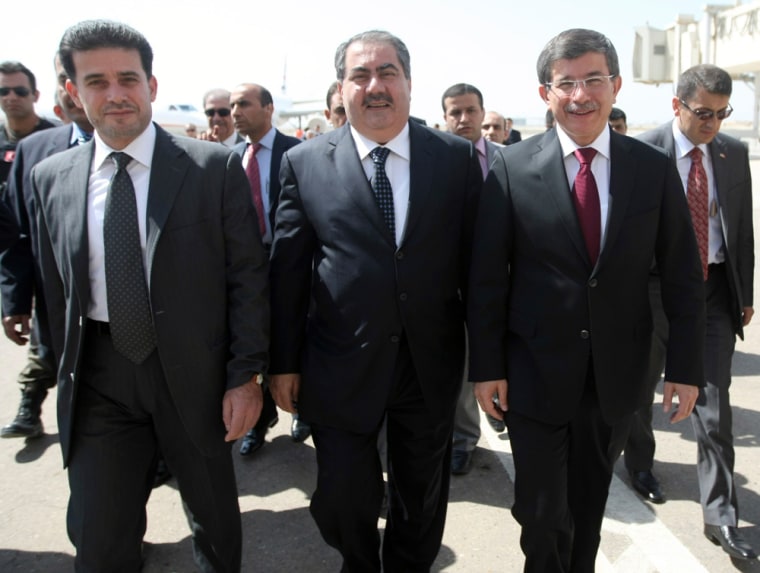Syria rejected Iraqi allegations that it has been used as a launching pad for violence in Iraq, while Iraq's foreign minister insisted Monday that Damascus turn over suspected insurgent operatives and warned failure to do so would be considered "unfriendly."
The tension, which was sparked by deadly suicide attacks on government ministries in Baghdad less than two weeks ago, threatens to set back efforts to persuade Damascus to help Iraq. It could also complicate the Obama administration's recent attempts to improve relations with Syria.
The U.S. has long been concerned about the infiltration of foreign fighters through Syria into Iraq and the country's cooperation is vital for securing parts of northern Iraq where violence has remained high, such as Mosul.
The Iraqi government has blamed an alliance of al-Qaida in Iraq and Saddam Hussein loyalists it says are based in Syria for the Aug. 19 ministry bombings, which killed about 100 people. Iraq has demanded that Syria extradite the suspects, but Damascus has claimed the allegations are politically motivated and demanded proof.
Turkish Foreign Minister Ahmet Davutoglu shuttled between Iraq and Syria on Monday trying to reduce tension, but the two countries continued to trade accusations.
War of words
Syrian President Bashar Assad sharply criticized Iraq for linking his country to the bombings without providing the evidence that Syria has demanded.
"When Syria is accused of killing Iraqis at a time it's hosting around 1.2 million Iraqis ... the least that can be said about this accusation is that it's immoral," Assad said Monday during a joint press conference in Damascus with visiting Cypriot President Dimitris Christofias.
"It is unacceptable to have irresponsible accusations (against Syria) that hurt the developing path of Syrian Iraqi relations," Assad said later during a meeting with Davutoglu, according to the official Syrian Arab News Agency.
The dispute was compounded when Iraqi authorities broadcast a confession Sunday from a detained Saudi Arabian man who said he had received militant training in Syria.
Foreign Minister Hoshyar Zebari insisted the Iraqis were not accusing the Syrian government of involvement, but only asking it to hand over suspects and halt "all activities that harm security and the Iraqi people."
"Our accusation is directed toward the people in the Syrian territories who are involved in the explosions, and we consider the Syrian stance of hosting them as unfriendly," said Zebari.
But he added that the relations between the two countries "have not reached the point of no-return."
Progress in other areas
Prime Minister Nouri al-Maliki also appeared to set a limit on the rising tension in a statement issued shortly after meeting with Davutoglu. While he repeated demands that Syria hand over suspected insurgents and stop fighters from crossing the border, he also highlighted recent progress between the two countries to improve collaboration.
During al-Maliki's visit to Syria a day before the ministry bombings, the two countries agreed to form a strategic cooperation council and planned to open two oil pipelines to increase trade between the two countries.
The prime minister's trip came about a week after a White House delegation visited Damascus to discuss Syrian cooperation in securing its border with Iraq and promoting Mideast peacemaking. The visit, which was part of the Obama administration's diplomatic outreach to improve ties with Syria, annoyed the Iraqi government, which asserted that it alone should discuss the country's security with Damascus.
American commanders have said there has been a decline in the number of foreign fighters crossing from Syria into Iraq, citing political pressure and beefed up security along the border.
Turkey mediates
But Syria is home to a number of Iraqis who were mid-ranking and senior members of Saddam Hussein's outlawed Baath Party. Iraqi officials say Damascus allows them to live and engage in political activity in Syria.
Davutoglu also planned to meet leaders in Syria later Monday. Iranian Foreign Minister Manouchehr Mottaki also visited Iraq and Syria on Sunday in an attempt to mediate the dispute between the two countries, which are both close allies of Iran.
Zebari said Iraq did not ask Turkey to intercede with Syria on its behalf but welcomed any effort to help ease tensions.
"Both sides need Turkey's help to solve the crisis," he said. "We should stop exchanging accusations through the media and communicate in order to reach a solution in the crisis."
Syria and Iraq restored diplomatic relations in 2006, ending a 24-year break that began when Damascus accused Iraq of inciting riots in Syria in 1982.
